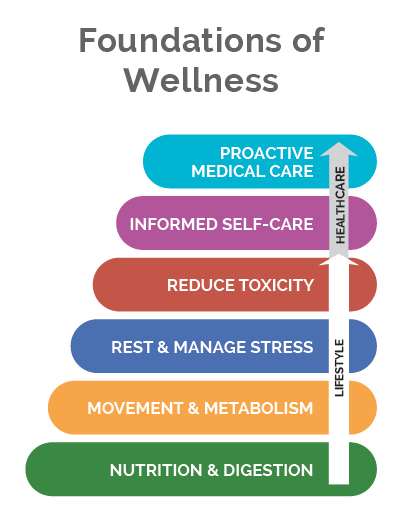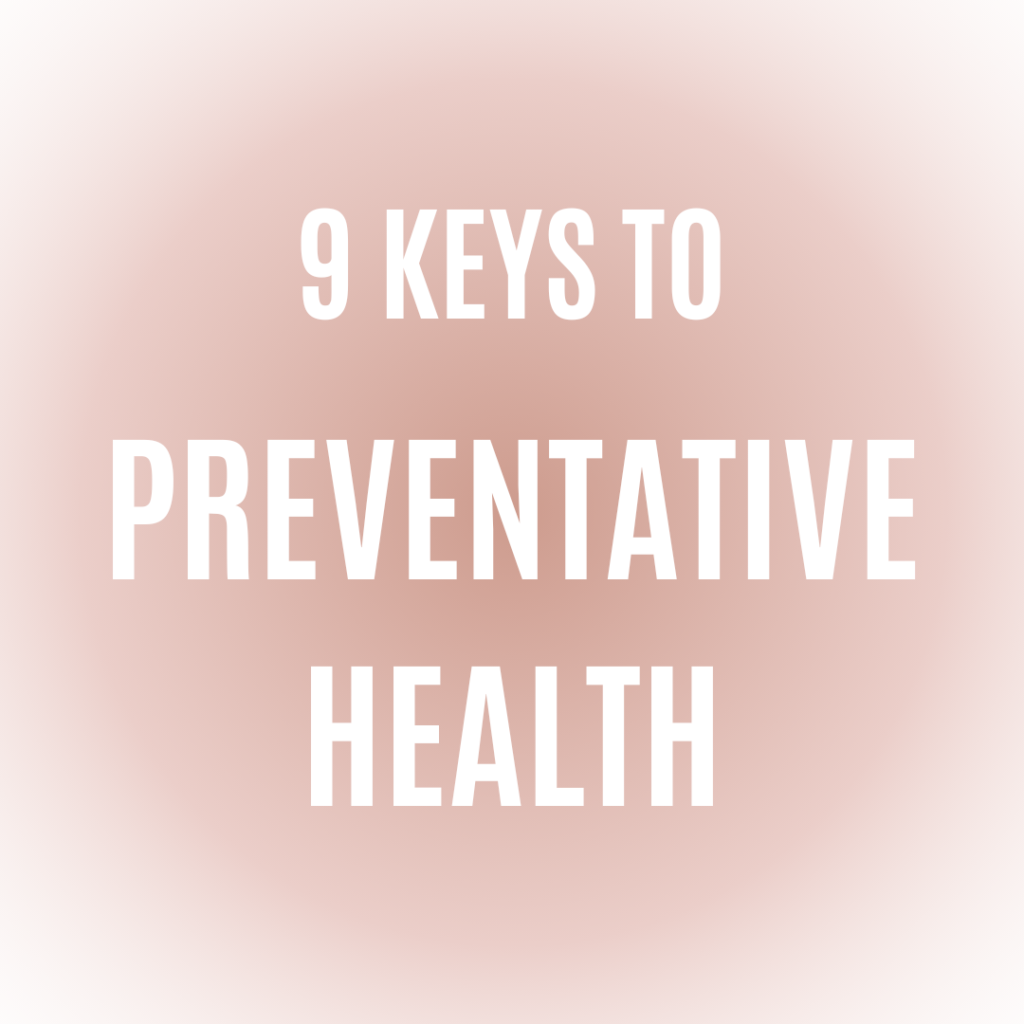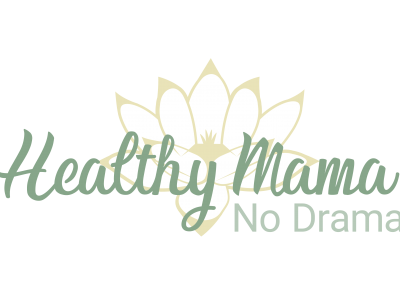It’s so nice that there are many options available to us nowadays to address the various health and wellness concerns that arise from day-to-day. But, what about being preventative with our health and wellness? I think we could all agree that it’s much better to be preventative than to react as things happen. I mean, would you rather avoid back problems or have to treat them once they’ve occurred? Or would you rather avoid diabetes, or have to treat it for the rest of your life? It’s kind of a no brainer, right?! So, how can we effectively be preventative with our health and wellness?
Wellness Pyramid
I would like to submit to you that there are 9 key ways you can be preventative with your health and wellness. But, before we chat about what those are, I’d like to show you this wellness pyramid. Notice the first four levels of the pyramid are lifestyle choices.

Do you notice that with each of those bottom four levels, they’re all areas of your life that you have control over?
The biggest impact that you can have on your preventative health and wellness are variables that are 100% within your control!
Take a second and read that again.
Isn’t that so freeing? To know that we really can control the trajectory of our health and wellness is so huge! I heard a saying once that genetics loads the gun, but lifestyle pulls the trigger. Let the magnitude of that statement sink in.

So what are those 9 key way to be preventative with your health and wellness? You might notice some correlation with that wellness pyramid. That’s not a coincidence!
1. Proper nutrition
Nutrition is vital to our health! When our bodies lack the necessary vitamins and minerals, our immune system is weakened, inflammation sets in, and gut health suffers. And, because of the gut brain axis, when our gut health suffers, so does our mental health.
So, how can we support our bodies getting proper nutrition? One important way is through diet. Limiting as much processed food, sugar, and other nutrient-deficit foods will really help give your body what it needs. Prioritize plants in your diet. That doesn’t mean you can never have the “no-no” foods, but limit them as much as you can. Just focus on foods that are nutrient-rich instead.
2. Support optimal gut health
Our gut is considered our body’s second brain. It’s a powerful place in the body and, therefore, needs to be taken well care of! When our gut microbiome is out of balance, so many different issues can set in: autoimmune disorders, inflammation, mental health, digestive issues, and more.
One of the best ways to support a balanced gut microbiome is to take a high quality probiotic. Just make sure that what you take has a diverse number of active probiotic cultures, and that it will survive the stomach acid and reach your lower intestinal tract.
I also recommend just about everyone needs to be on a digestive enzyme supplement. This will offer a great amount of support to your gut health as well, helping your body break down food, absorb nutrients, and metabolize it into energy. As we age, our bodies produce less digestive enzymes and (due to the standard diet) we really do need to supplement to make up the difference!
Here is my favorite probiotic (double encapsulated for maximum benefit) and digestive enzymes (they’ve made a HUGE difference in my gut health).
3. Decrease inflammation
This closely ties in with the first 2 (nutrition and gut health) as what we eat can have a significant impact on the amount of inflammation in our bodies, especially in our gut. But inflammation can also come from other sources (like stress). And, while chronic inflammation doesn’t impact daily function, it can make people you more susceptible to developing a slew of more serious health concerns like arthritis, asthma, autoimmune disorders, mental health issues, cancer, and more. So, how do we limit inflammation in the body?
- Eat an anti-inflammatory diet. Eating processed foods, sugars, the wrong fats, etc. all cause inflammation in the body. Here is a more in-depth breakdown of what an anti-inflammatory diet could look like.
- Let your body rest – nighttime sleep and even daytime rest give your brain and your body relief from inflammation that can be caused by things like stress.
- Exercise – certain inflammatory markers can be produced by fat cells. So, but decreasing obesity, you’re also able to decrease inflammation.
- Reduce stress – one of the ongoing factors that contributes to inflammation in the body.
- Watch your blood sugar levels – I mentioned avoiding excess sugar, but that’s not the only thing that can cause your blood sugar levels to spike. Not drinking enough water, caffeine, eating something high in carbs without balancing with protein, not getting enough sleep, stress, and more are all other causes of blood sugar spikes.
For something that addresses many of these areas, and more, read about my favorite collagen supplement.
4. Reduce stress
Not only does stress cause inflammation in the body, it can cause other issues like weakened immune system, headaches, indigestion and upset stomach, high blood pressure, high blood sugar, chest pain, muscle tension, insomnia, and more. While none of these are good or enjoyable in the short term, in the long term they can cause more issues.
5. Optimize metabolic health
Only 1 in every 14 people in the US have optimal cardiometabolic health. We are literally in a health crisis. Some key indicators of your metabolic health include things like cholesterol, blood pressure, and blood sugar levels being out of normal range; excess trunk fat, low energy/stamina, and more. The astounding thing is that research is showing that our metabolic health and our biological age are inseparable. What does this mean? The worse your metabolic health, the faster your body will age. Yikes! If this is an area you know you want to improve, read more about metabolic health here.
6. Keep your body moving
Our culture is becoming more and more sedentary. Why is this a problem? A sedentary lifestyle is now being linked with various diseases and health concerns including obesity, hypertension, back pain, cancer, cardiovascular disease and depression. Suffice it to say, incorporating a moderate amount of movement into your routine is a great idea. The ideal goal is 30 minutes a day, 5 days a week. And, make sure to include some strength training. That being said, start small and work your way up to that goal if you’re nowhere near 30 minutes a day. Smaller steps will be more sustainable long-term.
7. Get enough sleep
There are both immediate benefits and long-term benefits that come with getting adequate sleep. Sleep is an important function that allows our bodies and minds to recharge, our bodies to fight illness and disease, and allow to proper cognitive and emotional function the following day. People who do not get enough sleep could have a great risk of developing various heart conditions, hormone imbalance, poor metabolic health, weakened immune system, and thinking and memory issues. Most adults need between 7-9 hours, children and adolescents need significantly more.
8. Take quality supplements
Due to the poor quality of our soil today, even someone who eats a really clean diet has a very difficult time getting all of the nutrients that our bodies require to function properly. When our bodies lack nutrients, our immune system is greatly weakened, inflammation can set in, and our mental health is affected (read more on the gut brain connection here). A good, easily digestible, whole food supplement is a great way to fill in the gap and give your body the nutrients it needs.
There are a lot of options on the market today, many of which actually do more harm than good for your health. So, if you’re going to invest in a supplement, make sure it’s a good quality. Look for these 3 things:
- no synthetic ingredients
- high bioavailability (ingredients absorb will into your body)
- adequate dosage of those ingredients
The number one supplement I recommend is called the Lifelong Vitality Pack. It includes:
- a cellular health complex with antioxidants to support energy and inflammatory support
- omegas for brain and heart health
- whole food essential vitamins and minerals (12 servings of fruit and vegetables)
This supplement set along with my favorite double-encapsulated probiotic and digestive enzymes are the key to a healthy gut (which is key to a healthy YOU). Check out all three here.
9. Get toxins out of your home
Toxins are everywhere in our homes. In our cleaning products, personal care products, air fresheners, household products, medicine cabinet, etc. It can feel really overwhelming to try an overhaul your entire home all at once. But that’s where I come in! My job (and what I get oddly excited about) is helping people determine the best place to start and how to find effective and affordable alternatives. If this interested you, reach out and we can chat!
There you have it! The keys to preventative health! Please do not try to make changes in all of these areas at once. Pick one or two and start there. If you would like more info in any of these areas, or just want someone to partner with you as you begin to make adjustments, please feel free to reach out. That’s what I do…it’s what I live for. (Did you catch me channeling my inner Ursula there? Ha! I may have watched that movie a few too many times as a kid.) But seriously, I’d love to join you on your health journey and support you in any way I can.
Related posts:
- Gut Health: The Shocking Truth A healthy gut is foundational to a healthy you. The human gut does more than just digest food and absorb nutrients. There's a reason it's called the second brain. Your...
- Anti-Inflammatory Diet One of the best ways to fight inflammation in your body does not come from a drug store. Instead, it comes from the grocery store. By simply choosing to incorporate...
- Collagen: everything you need to know Collagen is quickly becoming a “trendy” supplement for many reasons. But, everything you "know" about it may be wrong. Why do you need to supplement collage, and how do you...
- 11 Better-than-Melatonin Tips for Quality Sleep A good night’s sleep is actually just as important as regular exercise and a healthy diet? And, while many turn to melatonin to support a good night's sleep, there are...



Thanks.